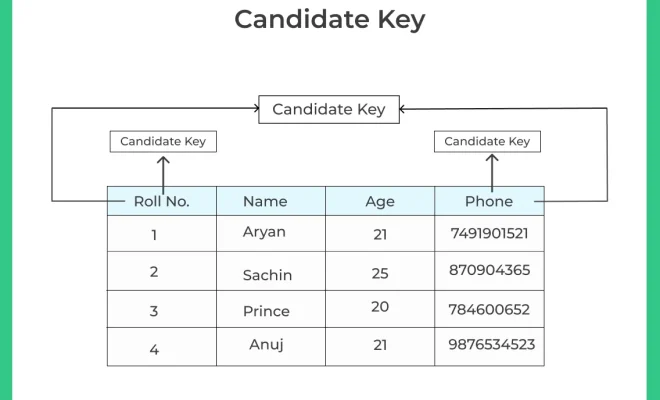The Definition of a Candidate Key

In database management, a candidate key is a set of one or more attributes that can uniquely identify each record in a table. The concept of candidate keys is an essential component of database design, as it helps to ensure data integrity and consistency.
What is a Candidate Key?
A candidate key is a set of attributes that can uniquely identify each record in a table. A candidate key must satisfy two properties:
1. Uniqueness:
Each value in the candidate key must be unique across all records in the table.
2. Minimality:
No subset of the candidate key can uniquely identify each record in the table.
For example, consider a table of employees that contains the following attributes: employee ID, first name, last name, and email. The employee ID could be a candidate key, as each employee has a unique ID, and no subset of the candidate key (such as first name and last name) can uniquely identify each record in the table.
Primary Key vs. Candidate Key
A primary key is a candidate key that has been chosen as the main identifier for a table. A primary key must satisfy the same properties as a candidate key (uniqueness and minimality), but it is typically chosen based on considerations such as ease of use, performance, and consistency with other tables in the database.
In the example above, the employee ID could be chosen as the primary key, as it satisfies the properties of a candidate key and is likely to be easier to use as a primary identifier than other attributes such as first name or email.
Conclusion
In summary, a candidate key is a set of one or more attributes that can uniquely identify each record in a table. Candidate keys are an essential component of database design, as they help to ensure data integrity and consistency. By understanding the concept of candidate keys, database designers can create efficient and effective database structures that meet the needs of their users.
The Definition of a Candidate Key
In the world of databases, candidate keys play a crucial role. A candidate key is a unique identifier for each record in a table. It is a set of one or more attributes that can uniquely identify each record in a table. In other words, it is a combination of columns that can uniquely identify a row in a table.
The candidate key is important because it helps to maintain data integrity by ensuring that each record in a table can be uniquely identified. This is important because it allows for efficient searching, sorting, and indexing of data.
There are two types of candidate keys: primary keys and alternate keys. A primary key is a candidate key that is chosen to be the main unique identifier for a table. An alternate key is a candidate key that is not chosen to be the primary key but can still be used to uniquely identify a record in a table.
To be considered a candidate key, a set of attributes must satisfy the following conditions:
Uniqueness:
Each value in the candidate key must be unique across all records in the table.
Non-redundancy:
There should be no redundant data in the candidate key. In other words, the candidate key should not contain any attributes that are already present in another candidate key.
Irreducibility:
The candidate key should not be able to be reduced to a smaller set of attributes that can still uniquely identify each record in the table.
It is important to note that a candidate key is not the same as a foreign key. A foreign key is a column or set of columns in one table that refers to the primary key of another table. This creates a relationship between the two tables.
In conclusion, a candidate key is a unique identifier for each record in a table that helps to maintain data integrity. It is a set of one or more attributes that can uniquely identify each record in a table. To be considered a candidate key, a set of attributes must satisfy the conditions of uniqueness, non-redundancy, and irreducibility.





